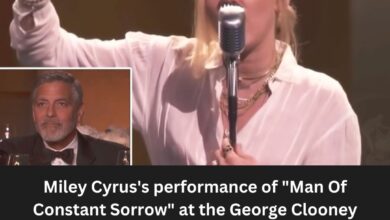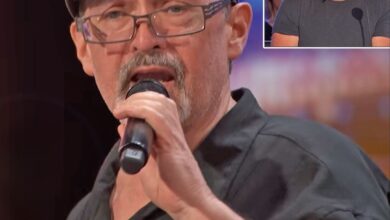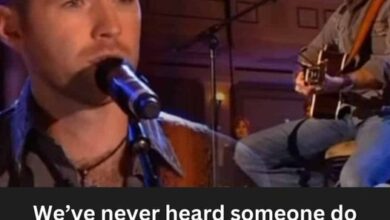Voice heavy with pain; two months later, he passed, a lion still, though weaker
Johnny Cash’s final live performance took place on July 5, 2003, at the Carter Family Fold in Hiltons, Virginia, marking a poignant chapter in the storied career of one of America’s most iconic musicians. This performance was a testament to Cash’s resilience and dedication, occurring merely two months before his passing and following the recent loss of his beloved wife, June Carter Cash. Despite his deteriorating health, including severe vision loss and physical frailty, Cash summoned the strength to deliver a memorable evening of music that resonated deeply with the audience.
The concert commenced with Cash’s trademark introduction, “Hello, I’m Johnny Cash,” a phrase that had become synonymous with his enduring legacy in American music. Accompanied by a modest band featuring his son, John Carter Cash, on vocals, Jerry Hensley on guitar, and Bobby Starnes on bass, Cash embarked on a journey through his most cherished songs. The setlist included classics such as “Folsom Prison Blues,” “I Walk the Line,” “Ring of Fire,” “Big River,” and a poignant rendition of Kris Kristofferson’s “Sunday Mornin’ Comin’ Down.”
One of the most emotionally charged moments of the evening came when Cash performed “Angel Band,” a song famously sung by Emmylou Harris at June Carter Cash’s funeral. This deeply personal tribute underscored the profound loss Cash was grappling with and the enduring love he held for his late wife. Additionally, Cash revisited “Understand Your Man,” a song he had not performed in over two decades, infusing the concert with a sense of nostalgia and reflection.
Despite his weakened voice, Cash’s performance resonated with emotional depth and sincerity. He engaged with the audience in intimate moments, speaking about the presence of June’s spirit and the inspiration she continued to provide him. This connection between personal grief and artistic expression highlighted Cash’s ability to weave his life experiences into his music, creating an authentic and moving experience for those in attendance.
Johnny Cash’s career spanned multiple decades and genres, earning him a place as a cultural icon and a voice for the downtrodden. His distinctive baritone voice and rebellious spirit became hallmarks of his music, which ranged from country and rock to folk, capturing the essence of American life with honesty and empathy. Beyond his musical achievements, Cash was known for his advocacy work, particularly on behalf of prisoners and social justice issues, reflecting his deep-seated compassion and sense of social responsibility.
Throughout his final performance, Cash’s unwavering commitment to his art was evident. Despite the physical limitations imposed by age and illness, he delivered a performance that was powerful and resonant, showcasing his enduring talent and the raw emotion that defined his music. His ability to connect with audiences on such a profound level cemented his status not just as a musician, but as a cultural icon whose influence transcended generations.
Johnny Cash passed away on September 12, 2003, leaving behind a legacy that continues to inspire musicians and fans alike. His final performance at the Carter Family Fold remains a poignant reminder of his unparalleled contribution to American music and his unwavering dedication to his craft. It was a fitting conclusion to a remarkable career defined by resilience, authenticity, and a relentless pursuit of truth through song.





